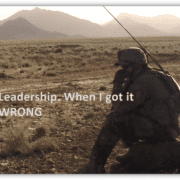When I was a young boy I made a monumental mistake.
My rebellious friends and I had managed to swipe a big box of matches. We headed down to the makeshift BMX ramps in the nearby pine forest that surrounded our suburb. It wasn’t long before we figured out that, with a simple hold and flick, we could shoot matches at each other.
Who would have thought that hundreds of flaming matches in combination with a dry and arid Australian bushland would be a recipe for disaster?
It didn’t take long before we started a small brush fire. We tried to stop the spreading flames by taking off our T-shirts and smothering the flames. With a little bit of luck and some lateral wind, we won the battle and went home.
Hours passed uneventfully. Then there came a knock at the door. One of my friends stood on the stoop next to his dad. My heart practically stopped.
My friend’s dad filled my dad in on what had happened. With every word that passed, my father’s rage grew as fast as that brushfire. After they had left, he turned to me and said one simple and entirely unexpected thing:
“Where was your self-discipline?”
Now, courtesy of one of the most disciplined men I know, I pose that same question to you.
Where is Our Self-Discipline?
Society has evolved rapidly, with the last ten years alone spawning huge innovations in technology, population expansion, globalization, and leadership. And yet in other, more subtle ways, we have regressed. It has become more acceptable to withdraw from accountability. Truth has slowly been replaced with whatever makes us comfortable. We’ve stopped telling people what they need to hear in favor of what will make them happy. We make excuses for people’s bad behavior in order to avoid difficult conversations. As a result, many people feel disconnected, even irrelevant, from those around them.
Our minds are often geared to resist change, whether out of laziness, risk avoidance, or fear. To combat this resistance requires finding a purpose, such as serving others. But without the will to act, people remain in a state of limbo. They have a lot of ideas but rarely have the calloused knuckles of a person who does the work to make them a reality. To borrow a phrase, they are all talk and no action.
Recognizing this and finding the will to change is the start of how to improve self-discipline.
The Art of Doing What’s Necessary–Whether You Want to Or Not
If we do not discipline ourselves, the world will do it for us.
-William Feather
During my military career, I met some of the most disciplined people in the world. They would stop at nothing to achieve the goals required for their individual and team success. If they were scared, they bit their lip and did it anyway. If they were underperforming, they trained harder. If they were hurt, they found another way to contribute. If they did not figure out how to improve their own self-discipline, you can bet their superiors would do it for them.
In civilian life, you don’t have a commanding officer or a unit of other soldiers that will hold you accountable. If you do not follow through on the tasks you set for yourself, it will be your own loss. Therefore, you have to be responsible for how you improve your self-discipline on your own.
How to Improve Your Self-Discipline in Three (Not So Easy) Steps
Perform An Honest Self-Evaluation
If you struggle with how to improve your self-discipline, start by asking yourself the following questions:
- Do you only do things when influenced by others?
- Do you understand your purpose? Does it influence your daily activities and behaviors?
- Do you routinely blame external influences or people for your failures?
- Do you judge other people on their lack of performance? Do you judge your own lack of performance on the same scale?
- Are you unhealthy in body and mind?
- Are you lazy?
If you can’t answer any of these questions, or if the answer you give is unfavorable, then you need to examine further:
- Why are you in this unfavorable circumstance? More specifically, what was your role in the events that brought you to this point?
- Do you have the ability and the interest in taking the necessary steps to change it?
It’s not easy, but if you’re really struggling, this is how to jumpstart your improved self-discipline.
Get Used to Accountability
Think about the New Year’s resolution you made. Did you follow through on your goal or not? If not, did you take responsibility for that decision?
It is not someone else’s responsibility to fix your job, your finances, your relationships, or your life. If you want to improve your self-discipline, you must own your behavior, your attitude, and your results. When you make a mistake or do something wrong, you must accept responsibility without making excuses or redirecting the blame.
Be Comfortable Being Uncomfortable
Regardless of what we might want, life is never going to be easy. Our existence plays out in an environment full of chaos, uncertainty, and friction. By placing our fate in the hands of that environment, we surrender control of our own futures.
Most people avoid discomfort like the plague. But if you’re looking for how to improve self-discipline, it’s time to start seeking it out. The more uncomfortable, the better. Eventually, you will have spent so much time feeling uncomfortable that it will become familiar. Then you will be able to make choices that can significantly improve your life and circumstances, no matter how untenable they once seemed.
This doesn’t mean you have to jump into a snake pit, proverbial or otherwise. Instead, commit to doing something small that you’ve been avoiding (a phone call, an errand, etc) and get it done. Tomorrow, do something slightly bigger, and so on. This is how you improve self-discipline–by forcing yourself to confront the most tedious or unpleasant items on your to-do list and finish them. You have a lot more control over yourself and your future than you think.
In Conclusion
If you’re seriously looking for how to improve your self-discipline, start by accepting accountability for your actions. Identify behaviors that are counter-productive and stop them. Surround yourself with people that are also on a journey of betterment, but don’t rely on them to do the work for you.
If you want to commit to sustained, long-term success, I say:
Ad Meliora – Onwards to better things.
As a place to start, you might consider enrolling in the 8-week online leadership training course from The Eighth Mile Consulting. Your self-disciple will be tested with four self-paced modules, plus regular interactive virtual workshops and individualized coaching to keep you accountable. Check out the course description or contact us for more information.


 The Eighth Mile Consulting
The Eighth Mile Consulting  The Eighth Mile Consulting
The Eighth Mile Consulting 
 The Eighth Mile Consulting
The Eighth Mile Consulting  The Eighth Mile Consulting
The Eighth Mile Consulting 
Trackbacks & Pingbacks
[…] Follow through. If you’ve told them you would have an answer for them by the end of the day, do it. […]
[…] partner or online community. However, at the end of the day, what progress you make is your responsibility, and yours alone. Whether you succeed or fail on that account lies squarely within your […]
Leave a Reply
Want to join the discussion?Feel free to contribute!